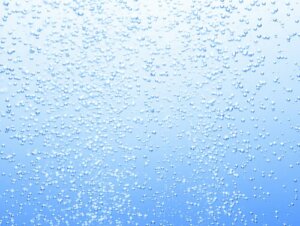Is it Good to Drink Sparkling Water Every Day?


Written and verified by the nutritionist Saúl Sánchez Arias
People often use sparkling water as a substitute for soft drinks or even alcoholic beverages. Some don’t like to drink regular water, which is why they resort to sparkling water to stay properly hydrated.
However, many people wonder if drinking sparkling water every day can have any negative health consequences. In this article, we’ll explain the consequences of this habit and which people should avoid consuming this product.
Sparkling water helps keep you hydrated
Drinking sparkling water is an effective way to keep your body hydrated and in optimal working condition. According to an article published by the journal Nutrients, dehydration can be fatal.
Water is essential for cellular homeostasis, to regulate temperature, and to guarantee correct blood flow. In this context, drinking sparkling water can guarantee a correct state of hydration. However, experts recommend combining it with regular flat water.
Despite being a very refreshing drink, you shouldn’t drink more than two glasses of it with your meals. If you feel thirsty, you should opt for still mineral water.

This article may interest you: Diet for Dehydration: What You Should Consider
It may cause stomach problems
One of the disadvantages of sparkling water is that it can make digestion difficult in people prone to suffering from flatulence, for example. Exogenous gas can slow down the digestive process. Therefore, drinking it makes stomach or intestinal discomfort more likely, which makes it difficult for your body to carry out daily tasks.
Experts discourage certain people from drinking this type of water at all. For example, those who suffer from hiatal hernia or frequent reflux. According to an article published in the journal BMC Gastroenterology, irritable bowel patients should also avoid this product.
Be careful with its sodium content
You can find several types of this type of water on the market. You must read the labels carefully and pay close attention to the amount of sodium they contain. An excessive intake of this mineral could increase blood pressure, which could negatively affect your cardiovascular health.
On the other hand, you shouldn’t confuse sparkling water with soda. The latter contains sugar, which is why experts advise against it. It falls into the group of sugary soft drinks. As such, you should only drink it sporadically.

You can drink this product as a way to cut down on soda
A person who’s used to drinking sugary soft drinks could benefit from including sparkling water in their diet. They can substitute the consumption of one drink for another, since they’re organoleptically similar.
Remember that the regular consumption of soft drinks is counterproductive for your health. This is due to their high sugar and additive content. For this reason, experts recommend reducing their intake to prevent the development of diseases in the medium and long term.
You should also read: Do You Know How and When to Drink Water?
Drink sparkling water… in moderation
Sparkling water is a refreshing drink that can be included in a healthy diet. However, you should drink it in moderation to avoid possible gastric problems that are associated with its consumption.
But certain groups of people shouldn’t drink it at all. Patients who suffer from stomach problems should avoid the consumption of carbonated drinks, including sparkling water.
However, those who are used to consuming soft drinks can benefit from drinking sparkling water. Never forget to read the nutrition fact labels. Choosing products that are low in sodium will help prevent future health problems.
Lastly, remember that this drink isn’t the same as soda. The latter contains a lot of sugar. For this reason, experts recommend against it and you should limit its consumption.
All cited sources were thoroughly reviewed by our team to ensure their quality, reliability, currency, and validity. The bibliography of this article was considered reliable and of academic or scientific accuracy.
- Armstrong LE., Johnson EV., Water intake, water balance, and the elusive daily water requirement. Nutrients, 2018.
- Litleskare S., Wensaas KA., Eide GE., Hanevik K., et al., Perceived food intolerance and irritable bowel syndrome in a population 3 years after a giardasis-outbreak: a historical cohort study. BMC Gastroenterol, 2015.
This text is provided for informational purposes only and does not replace consultation with a professional. If in doubt, consult your specialist.








